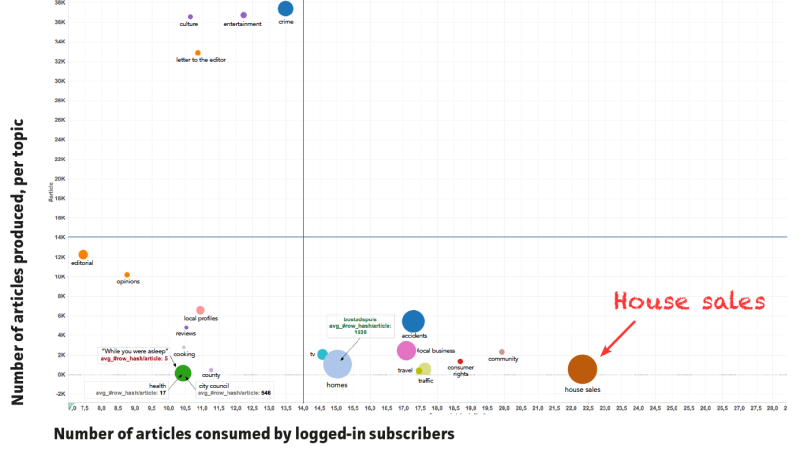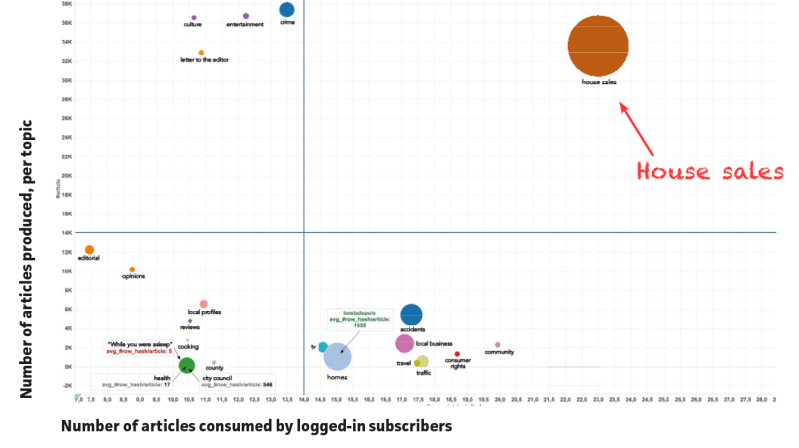
Partner Content*: Automated property journalism is delivering huge value for publishers in Scandinavia by delivering a level of granular detail readers demand, but which manual reporting cannot supply.
Where there is data, there is scope for news automaton – and property sales are all about the numbers. Reader surveys have shown there is a huge appetite for local property news.
Following its success with United Robots’ first live sports robot, Sweden-based MittMedia, decided to investigate what other areas might benefit from automation.
In an effort to decrease subscriber churn, the newsroom mapped the content it was producing against reader behaviour, producing a matrix that showed particular engagement in property sales, but few actual stories being generated to serve demand.
This discovery prompted the development of Real Estate Robot. Built by United Robots and trained by a MittMedia journalist, it joined the editorial desk in late 2017, immediately producing hyperlocal, granular stories across the group’s portfolio of 19 local news sites.
The number of property-related stories per-site grew from two-per-month to 480 per-week. In a single year, the bot generated 61,800 property articles and a total of 17.6 million page views.
Property bots become the norm in Swedish newsrooms
In the four years since, most local news publishers in Sweden have begun to produce automated real estate content with United Robots. This takes a mixture of forms, from single sales stories, complete with imagery, to aggregate rankings and top lists across an array of metrics.
United Robots offers publisher partners a unique content-as-a-service platform, utilising large data sets to create automated articles for publication. Artificial intelligence defines the angle, a natural language generation tool generates text.
The Swedish tech company is founded and run by former journalists, with solutions driven by an implicit understanding of newsroom priorities and pain points.
“As with almost all of our product developments, the Real Estate robot was inspired by publisher requirements,” says Cecilia Campbell, chief marketing officer of United Robots, which, as also automates traffic, business and weather content.
“There is still a tendency for newsrooms to be prescriptive; to focus on what they think people should be reading. MittMedia decided to do things the other way round: what do people want to read?
“Look at the matrix they created and you see a big amount of arts articles being produced, for example, but very little engagement. At the other end of the scale, hardly any house sales content, but huge consumption of the stories that were published. Newsrooms might be much keener to write about culture than granular property news, but you can’t argue with data.”
Before automation, house sales stories were popular with readers but few were being written

After automation house sales stories were number one in terms of readership and volume of articles written

This data-led approach has led United Robots’ publisher partners to notable success.
Gota Media’s real estate bot produced 17,778 articles in 2020 alone and has enabled Gota to significantly expand its homes and living section.
Automation provides the foundation for such efforts, but it also gives reporters covering the beat the freedom to pursue high-impact, editorially-driven stories.
“The value of robot journalism lies in volume and granular detail at a local level, but you still want the storytelling to be done by humans,” explains Campbell.
“Automation can really help journalists in revealing larger stories and alerting the newsdesk to wider trends. A publisher can set the robot up in a such a way as to trigger alerts across any number of fields – whether that’s by area, property-type, or individual names. You can build engaging, quality journalism off the back of that.”
Automated property journalism: Educating the market
United Robots has expanded its real estate capabilities well beyond Scandinavia, with publisher partnerships under development in a number of geographies, including the US, most recently launching a strategic pilot partnership with California-based media group McClatchy.
The required UK data sets have also been secured, with the real estate bot ready to make its British debut.
Campbell spent nearly two decades living in Cumbria and sees huge potential for automation’s implementation in newsrooms across the country.
“As we enter new markets it’s about proving the concept and then looking towards scaling,” explains Campbell, who also highlights the potential of automated content around local company registrations.
“The idea is you start in your newsroom with something small and uncontroversial and build from there. Real estate is a great fit in that regard; no journalist wants to be poring over the latest house sale news, but those stories have been proven to engage people on a local level and drive traffic. It’s an opportunity to have unique, quality content nobody else is providing and in real volume.”
But newsrooms need to know exactly what they are looking to achieve through automation and how they will measure results.
As a general rule, readers pay for their local journalism in Sweden – content from MittMedia’s Real Estate robot was behind a paywall from launch, for example – and publishers have pursued a range of priorities, including driving reader revenues, expanding reach, and boosting retention levels.
“The automation is the easy part,” Campbell says. “We want to have honest conversations with publishers, looking at how it fits into what they are trying to achieve in a wider sense. Don’t just start automating elements of your coverage for the sake of it; volume alone is not going to deliver real value unless you’re harnessing it in a strategic way.”
 Promoted white paper: How newsrooms can leverage automation
Promoted white paper: How newsrooms can leverage automation
Read United Robots’ 12-page report on newsroom automation: It explains what it is and how it can make journalism better.
One journalist plus one robot=1m page views
It should also be a process led by editorial. Norway’s Bergens Tidende, for example, part of Schibsted, one of Scandinavia’s biggest publishing houses, only started producing automated real estate journalism in 2019, with the purpose of driving subscription sales.
In June 2020 it launched a new property sales vertical, publishing 12,000 articles annually, generating 1m page views and accounting for 5% of all article conversions across the network. The project was led by a single journalist with no technology background, working in close collaboration with United Robots developers.
“It’s essential you get that newsroom buy-in and leadership,” Campbell explains. “If it comes down to just one tech pioneer leading the charge, it only takes them leaving, or a new editor coming in, and that’s the end of the project.
“You’re going to encounter some scepticism internally and you must address that. But I can feel attitudes starting to change and momentum building. Newsrooms are now looking much further afield for new ideas and best practice. Automation has become the norm in Scandinavia. Our publishing partners are incredible evangelists for its benefits, and we see the receptive audience for that message growing.”
- United Robots explores this topic in the INMA webinar: How One Newsroom Robot Drives Significant Revenue (broadcast 10am, New York Time 22 September 2022 and available on demand).
- Peter Sigfridsson, Head of Production Development , Gota Media and Henning Johannesson, CPO , of United Robots are among the speakers at Press Gazette’s Future of Media Technology event series. They join the panel for the Content Management session taking place on 23 September at 3pm UK time.
*This article was produced in association with Press Gazette commercial partner United Robots. Download their whitepaper to find out more about how publishers can leverage automated journalism.
Email pged@pressgazette.co.uk to point out mistakes, provide story tips or send in a letter for publication on our "Letters Page" blog
